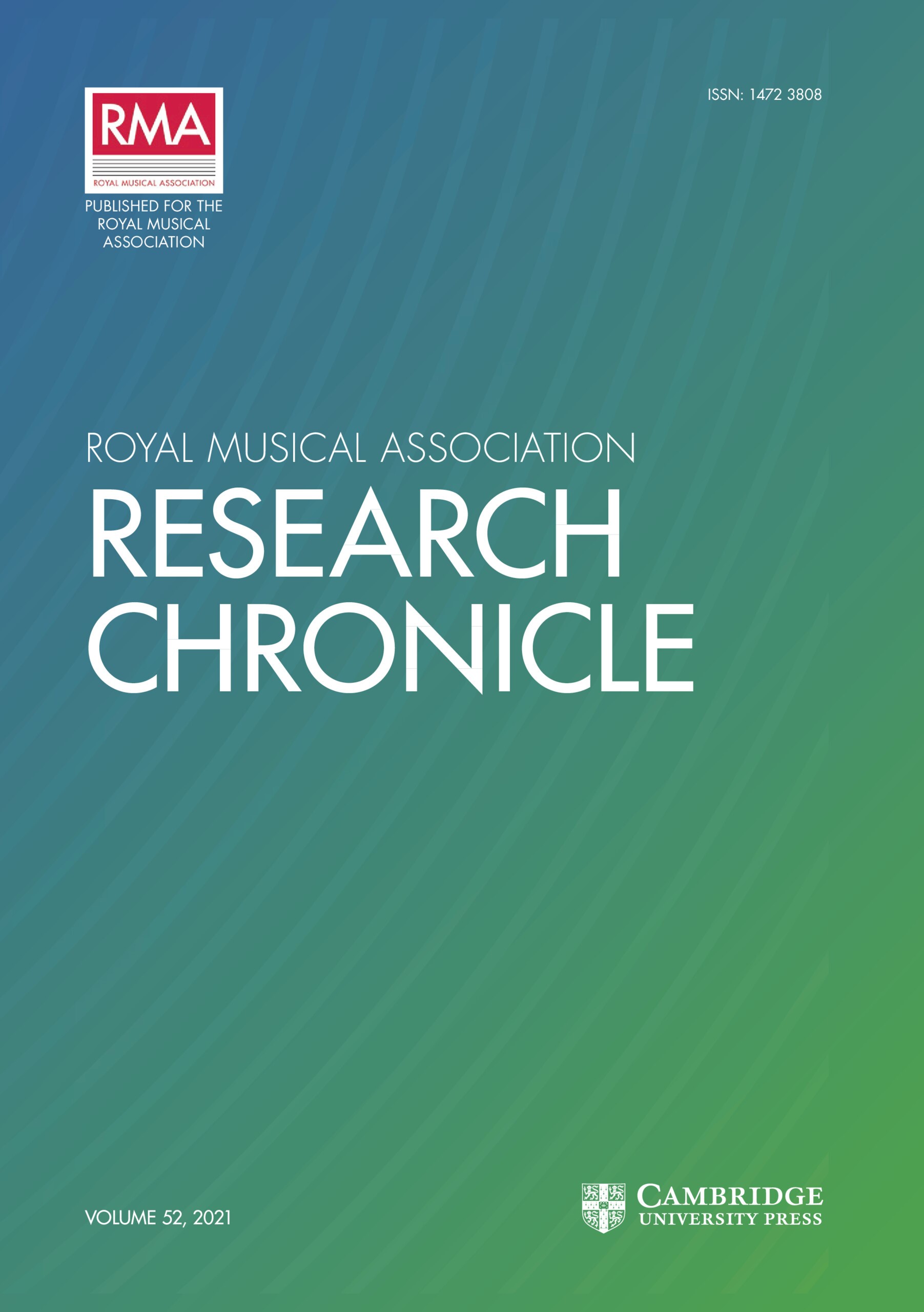No CrossRef data available.
Article contents
The Ferial Version of Purcell's I Was Glad
Published online by Cambridge University Press: 01 January 2020
Extract
There are many sources for Purcell's I was glad: the anthem was clearly very popular, existing both in a ‘symphony anthem’ form with strings and also in various ‘verse anthem’ versions with organ accompaniment. It was common to make arrangements of Purcell's most attractive anthems so that they could be performed in places and at times when strings were not available. The geographical spread of the sources suggests that I was glad was in the repertoire of most of the main choral foundations in England. The only autographs of the piece are of the ‘symphony anthem’ version, although very early sources not in Purcell's hand give the piece as a verse anthem with organ accompaniment. Some sources that we think of as secondary because they are not autographs could actually pre-date those in the composers' hand, and they provide evidence about alternative textual traditions, performance practice, and the reception of Purcell's music.
- Type
- Articles
- Information
- Copyright
- Copyright © Royal Musical Association, 2002
Footnotes
I am enormously grateful to Dr Robert Thompson for his help in the preparation of this article, and for advice and help given by Dr Jonathan Wainwright and Dr Keri Dexter.
References
2 It is also included in the word-book, A COLLECTION OF ALL THE ANTHEMS Daily us'd in Divine Service, throughout the Year, in KING'S COLL. CHAPPEL IN CAMBRIDGE… (1706). The full title is given in Lionel Pike, ‘Purcell's Rejoice in the Lord, All Ways’, Music and Letters, 82 (2001), 420, footnote 34.Google Scholar
3 See Pike, ‘Purcell's Rejoice in the Lord, All Ways’.Google Scholar
4 See Robert Shay and Robert Thompson, Purcell Manuscripts: The Prinicpal Musical Sources (Cambridge, 2000), 126–39.Google Scholar
5 See Shay and Thompson, Purcell Manuscripts, 142–3.Google Scholar
6 In Lionel Pike ed., The Works of Henry Purcell, Vol 14, Sacred Music Part II: Nine Anthems with Orchestral Accompaniment, Purcell Society (forthcoming). Bar numbers quoted in the present article all refer to that edition, whether ‘symphony’ or verse anthem type is being discussed.Google Scholar
7 Francis Sandford, History of the Coronation of James II (London, 1687).Google Scholar
8 Moreover, the Westminster Abbey (Lwa Triforium set 1) and Chapel Royal (Lbl MSS R.M. 27.a.l–6) partbooks, the very books that one might expect to have been used for the coronation, show no sign of the inclusion of strings. Many of the sources contain arrangements of the piece for use when strings were not available, so it is not absolutely impossible that the version with organ was sung at the coronation; but the piece was not written specially for that occasion, as the indices of Cfm MS 117 give the date as ‘1683‘.Google Scholar
9 Bruce Wood, ‘A Coronation Anthem - Lost and Found’, Musical Times, 118 (1977), 466–8.Google Scholar
10 Richard Charteris, ‘A Checklist of the Manuscript Sources of Henry Purcell's Music in the University of California William Andrews Clark Memorial Library, Los Angeles’, Notes, 52 (1995), 407–8.Google Scholar
11 Franklin B. Zimmerman, Henry Purcell 1659–1695: An Analytical Catalogue of his Music (London, 1963), 467; but see Shay and Thompson, Purcell Manuscripts, 135.Google Scholar
12 A canon of Worcester Cathedral.Google Scholar
13 Zimmerman, Analytical Catalogue, 471.Google Scholar
14 See Crosby, Brian, A Catalogue of Durham Cathedral Music Manuscripts (Oxford, 1986), 22–3.Google Scholar
15 Barry Cooper, ‘Hereford Keyboard Sources’, Research Chronicle, 16 (1980), 135–6. The reference is to Walsh's first collection of Volentarys & fugues made on purpose for the organ or harpsichord (London, 1791).Google Scholar
16 Benjamin Lamb (d. 1733) was organist at Eton and acting Master of the Choristers at Windsor.Google Scholar
17 James Kent, 1700–76, was organist of Winchester Cathedral, and helped William Boyce in the compilation of Cathedral Music.Google Scholar
18 Charteris, ‘Checklist of the Manuscript Sources of Henry Purcell's Music’, 410.Google Scholar
19 Zimmerman, Analytical Catalogue, 456.Google Scholar
20 I am unable to say whether this reflects on the character of the singers or on the pitch of the organ at Windsor.Google Scholar
21 See Shaw, HaroldWatkins, ‘A Contemporary Source of English Music of the Purcellian Period’, Acta Musicologica, 31 (1959), 38–14.CrossRefGoogle Scholar
22 Shay and Thompson, Purcell Manuscripts, 185 and 187.Google Scholar
23 In a personal communication to the author.Google Scholar
24 Watkins Shaw, The Bing-Gostling Part-books at York Minster. A Catalogue with Introduction (Croydon, 1986), 8.Google Scholar
25 See also the comments in Pike, ‘Purcell's Rejoice in the Lord, All Ways’., 415–16.Google Scholar
26 Ian Spink, Restoration Cathedral Music 1660–1714 (Oxford, 1995), 207.Google Scholar
27 Ibid., 207.Google Scholar
28 Ibid., 208.Google Scholar
29 Information kindly supplied by Kerry Dexter.Google Scholar
30 Shay and Thompson, Purcell Manuscripts, 150.Google Scholar
31 Spink, Restoration Cathedral Music, 221.Google Scholar
32 Comments kindly provided by Robert Thompson. See also Barra Boydell ed., Music at Christ Church Before 1800: Documents and Selected Anthems (Dublin, 1999), 146; also Shay and Thompson, Purcell Manuscripts, 158.Google Scholar
33 See Pike, ‘Purcell's Rejoice in the Lord, All Ways’, 409.Google Scholar
34 Peter Galloway, The Cathedrals of Ireland, The Institute of Irish Studies (Belfast, 1992), 82–3.Google Scholar
35 Grindle, W.H., Irish Cathedral Music, The Institute of Irish Studies (Belfast 1989), 94.Google Scholar
36 I owe the suggestion to Kerry Houston; see also Pike, ‘Purcell's Rejoice in the Lord, All Ways’. 410.Google Scholar
37 Boydell ed., Music at Christ Church, 266.Google Scholar
38 See Pike, Lionel, 'Alternative Versions of Purcell's Praise the Lord, O my Soul: O Lord my God, Irish Musical Studies 5, ed. Patrick Devine and Harry White (Dublin, 1996), 272–80.Google Scholar
39 Charteris, ‘Checklist of the Manuscript Sources of Henry Purcell's Music’, 419–20.Google Scholar


